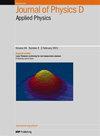Non-itinerant-type ferromagnetism and the magnetocaloric response of quinary all-d-metal ribbon: Ni35Mn34.5Co14Fe1Ti15.5
IF 3.2
3区 物理与天体物理
Q2 PHYSICS, APPLIED
引用次数: 0
Abstract
Most of the ferromagnetic shape memory (FSM) Heusler alloys, which are primarily studied in bulk form in the literature, exhibit p-d type hybridization. This study conducts a thorough multidirectional investigation of a strongly d-d hybridized quinary melt-spun annealed ribbon having the composition Ni35Mn34.5Co14Fe1Ti15.5 (NMCFT-1). This off-stoichiometric, polycrystalline FSM, fabricated using the melt-spin technique, exhibits a highly textured microstructure, double magnetic transitions and super-mechanical features mitigating brittleness. It crystallizes in a perfectly B2-type disorder austenite (Pm-3m, space group number 221) phase at room temperature. It has been hypothesized that geometric frustration is the causative factor for this disorder. Curie temperature of austenite phase ( ) between paramagnetic → ferromagnetic state is found to be ∼364.57 K, whereas martensite transformation temperature from weak magnetic martensite state to ferromagnetic austenite state is ∼174.74 K. Calculated moments (effective moment, = 5.12 ; low-temperature saturation moment, (or ) = 5.08 ) yield a Rhodes–Wohlfarth ratio of ∼1, indicating the existence of the non-itinerant nature of 3d electrons, whereas the ferromagnetism and the linear or non-linear dependency of ) on T2 around indicates the presence of long-range Rudermann–Kittel–Kasuya–Yosida-type interaction. More importantly, the maximum magnetic entropy change ( ) obtained across the first-order magneto-structural transition and second-order magnetic transition are +18.2 J·kg−1K−1 at 6 T and −8.8 J·kg−1K−1 at 2 T, respectively, while a very high working temperature span (ΔTFWHM) of 28.561 K and 6.922 K are found for the same condition. The sample exhibits a significant relative cooling power of 402.98 J·kg−1 at a magnetic field of 6 T across the FOMT and 60.19 J·kg−1 at a 2 T field across the SOMT, respectively, along with excellent mechanical features such as a Vickers hardness (HV) of 411.80 HV (∼4.04 GPa). Meanwhile, Chen’s super hard model fails to predict the ribbon’s HV value, but Miao’s hard model does, indicating that the ribbon is hard but not super hard. It also paves the way for additional investigation into innovative FSMs like this.二元全 D 金属带的非铁磁性和磁ocaloric 反应:Ni35Mn34.5Co14Fe1Ti15.5
大多数铁磁形状记忆 (FSM) Heusler 合金(文献中主要研究的是块状合金)都表现出 p-d 型杂化。本研究对成分为 Ni35Mn34.5Co14Fe1Ti15.5(NMCFT-1)的强 d-d 型杂化二元熔纺退火带进行了深入的多向研究。这种采用熔融纺丝技术制造的非均质多晶 FSM 具有高度纹理化的微观结构、双磁转变和可减轻脆性的超机械特性。它在室温下完全以 B2 型无序奥氏体(Pm-3m,空间群编号 221)相结晶。据推测,几何挫折是造成这种无序的原因。顺磁态→铁磁态之间奥氏体相( )的居里温度为 ∼364.57 K,而从弱磁马氏体态到铁磁奥氏体态的马氏体转变温度为 ∼174.74 K。08 )得出的罗兹-沃尔法特比为 ∼1,表明 3d 电子存在非巡回性,而铁磁性以及 )对 T2 左右的线性或非线性依赖性表明存在长程鲁德曼-基特尔-卡苏亚-尤西达型相互作用。更重要的是,在一阶磁性结构转变和二阶磁性转变过程中获得的最大磁熵变化( )分别为 6 T 时的 +18.2 J-kg-1K-1 和 2 T 时的 -8.8 J-kg-1K-1,而在相同条件下发现的极高工作温度跨度(ΔTFWHM)分别为 28.561 K 和 6.922 K。该样品在 6 T 磁场穿越 FOMT 时的相对冷却功率分别为 402.98 J-kg-1,在 2 T 磁场穿越 SOMT 时的相对冷却功率分别为 60.19 J-kg-1,同时还具有出色的机械特性,如维氏硬度(HV)为 411.80 HV(∼4.04 GPa)。同时,Chen 的超硬模型无法预测色带的 HV 值,而 Miao 的硬模型却能预测,这表明色带很硬,但不是超硬。这也为进一步研究类似的创新性 FSM 铺平了道路。
本文章由计算机程序翻译,如有差异,请以英文原文为准。
求助全文
约1分钟内获得全文
求助全文
来源期刊
CiteScore
6.80
自引率
8.80%
发文量
835
审稿时长
2.1 months
期刊介绍:
This journal is concerned with all aspects of applied physics research, from biophysics, magnetism, plasmas and semiconductors to the structure and properties of matter.

 求助内容:
求助内容: 应助结果提醒方式:
应助结果提醒方式:


